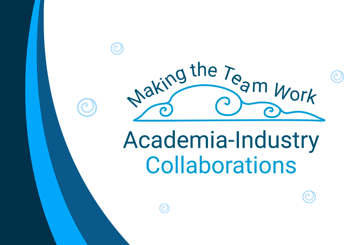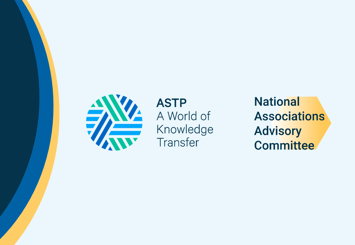
Academia–Industry Collaborations: Moving…
Across Europe, universities and research institutions are being called upon to play a more active role in driving…

“It is a really messy and exhausting job. So at least between us professionals we should be open and helpful and I think most of us are.”
Ilaria Volpi is a LifeArc-AUTM 2020/21 Technology Transfer Fellow currently working as postdoctoral research assistant at University of Dundee, UK. For ASTP, Ilaria interviewed Sara Matt, about the organisation of the 2021 ASTP annual conference.
Sara is member of the ASTP programme committee, head of the Transfercenter for Science, Economy and Society, University of Innsbruck, Austria. She has been a registered technology transfer professional since 2012, has been a member of several technology transfer expert groups in Austria and Germany, and served as an innovation expert for the Horizon 2020 project.
Ilaria Volpi: This year’s annual ASTP conference will be online due to the ongoing Coronavirus restrictions, what have been the major challenges in organising it in this format?
Sara Matt: It was a challenge because our annual conference is not only a meeting where you exchange information, it is really a very interactive meeting of like-minded people who are passionate about their jobs and want to share their challenges and problems. It is also important to have a safe place where you can get rid of stuff that they are annoyed about in your offices. We also expected to have more people than usual and then you also need really good software technology because it should run smoothly. I would say those were the major challenges. Of course it was also very important for us to have some fun sessions. You can meet for a yoga class, join the virtual morning run or sit at a table with someone in the coffee break. The annual conference should not only be about delivering information but also a nice time for the participants.
Ilaria Volpi: How many people have been involved in this year’s organisation?
Sara Matt: The core team of the programming committee is 4 people. We have been working together for many years and also very successfully because we have become friends, work efficiently and we know what people are interested in. So that is the core team working on the content, but we also have a strong support from the headquarters, and there are people from the board, who all come with new ideas, so it is a big effort from the whole team.
Ilaria Volpi: What do you think are the advantages of doing a virtual meeting?
Sara Matt: Of course we all love the face to face meetings, but there are advantages of being virtual too. Usually we have about 300 people attending the conference. The number of participants is not limited because not more people are interested in our offer, but is limited due to the added costs: flights and hotel, all this costs extra money and makes the participation too expensive.
And also this year we have a new offer: the Office Ticket, that means you buy one ticket for €1,500 euros and there is no limit on how many people from your office can attend the meeting. We have over 1,000 people, so it means many new faces will follow our conference and participate. Also, with regard to the speakers it was a big advantage because now we can have speakers from around the globe: these are some advantages, but we all hope that soon we have face to face meetings again.
Ilaria Volpi: So the first day of the meeting is focused on European policymakers, can you tell us a bit more about the speakers and why you chose them?
Sara Matt: Most of the speakers we know, for many years, because we try to get in touch with them. We want to have positive influence on the new calls which are coming out and on the initiatives of the commission because we are very close to the real world, we know the challenges. The Commission is also interested in our feedback because ASTP is informed and close to the business of KT: we all saw this as an excellent opportunity for an exchange of ideas.
Ilaria Volpi: The second day keynote session will be about the third mission of the universities, why do you think it is important to highlight the impact that universities can have on the society?
Sara Matt: It is pity that you still have always to highlight the valuable impact universities can have on society. I think that should be clear to everyone already, but is not. Much of the public see universities’ as really expensive institutions and research is expensive- no doubt. We have now the chance and also responsibility to change this perception.
All the money spend in universities and also our profession in the end comes from people. It’s taxpayers’ money that we spend and I think people should know it is well spent, that it is a really good investment in our future, in our welfare. You cannot really say that often enough. For me, the third mission is not just about licensing and patenting, it is also telling the people what we do and why it’s useful, and getting their feedback too. I think this is a major part of the third mission.
Ilaria Volpi: The third day the keynote session will be focused on Expectations from Investors, can you tell us more about this session?
Sara Matt: We have found two really good speakers. One, Stephan Christgau, that has his own fund and Teri Wiley, who is very experienced in the tech transfer business. I think they can give us a lot of useful insights, so that we, the KT people, can at least avoid the biggest mistakes that we could make.
Most of us come from universities, maybe having done a PhD, and often never left the academic world- so we do not have too much concept of the outside world. Of course there are big and well-equipped technology transfer offices that have people from industry, but that isn’t the general rule. What we often lack is the knowledge and feedback on what the investors want to see.
If we offer them (investors) what we think is important, like well done research, it is not what they want to hear: they want to see a unique selling proposition, they want to know: What the patent status is? How much longer can they have an exclusive license? They also want to know, for example in life sciences, Is it toxic? Can you store it? How difficult is it to deliver to patients? Meanwhile, our researcher thinks, I can show it works in the lab, it is fine we can sell it: no, you cannot, and therefore we need feedback from investors very urgently, it is much better to invite them so we can all listen.
Ilaria Volpi: What can you tell the people that have recently entered the knowledge transfer world for making the most of the meeting?
Sara Matt: I think it is most important to be open. It is not a meeting, where people just attend and give their success stories, highlighting what was successful. It is really about having a place where you can share your challenges.
As an example, when I started here in Innsbruck there were only like 5 or 10 colleagues in the whole of Austria, because it was a new profession. When I had a big challenge and I told them, they immediately would know who I was talking about, that is not so nice because you don’t want to talk about someone that everybody knows, but if you do it at an international level, I ask a colleague from the States: what would you do if your rector did this and that, this person has no clue who my rector is, so they can be open in their response.
Also, if I want to talk about challenges with my people, I need to do this with someone else that has the same challenges; that is a really big advantage. And I think we can also learn a lot by talking to people. Even when you think your question is stupid, most likely it is not. Everyone started like this and many questions are not stupid at all if you really think about them. So I found out when I started that going to this meeting is like learning a lot at speed because you just get all the information directly from people who have more experience than you have.
So tell people what is your challenge and try to get an answer. There are over 1, 000 people there, you should find someone who knows the answer. And most of us would also say, “I am not good at this…”, for example I am not life sciences, but I know so many people who are, so I would try to connect with them. And I think it is also possible now virtually that people give a problem and someone will help them to find the correct person to find in the breakout session and discuss with the person.
So really try to connect, do not sit in front of the computer and listen to the information delivered. Be actively involved in the sessions.
Ilaria Volpi: I am personally new in the field and my experience with the technology transfer people has been great I am getting a lot of support from all of them.
Sara Matt: We have so many problems in our day because we are in between all chairs. The rector expects something, the government expect something, industry wants everything from us, the researchers are pissed off because we are kind of interfering all the time. It is a really messy and exhausting job. So at least between us professionals we should be open and helpful and I think most of us are.
Ilaria Volpi: Finally, is there something else that you would like to tell this year’s attendees?
Sara Matt: I think it is great that we have so many people attending, thanks to the Office Ticket, so I encourage everyone attending to be interactive: to ask all the questions you ever had in your mind, put them in the chat and hopefully at some point in time you will get the answer. People should really exploit the fact that they are free to participate, not listen, I think that is the major advice that I would give, not only in virtual meetings, but also in face-to-face meetings.

Across Europe, universities and research institutions are being called upon to play a more active role in driving…

In an era where universities and research organisations are called upon to deliver more than just excellent teaching…

In the ever-evolving landscape of knowledge transfer, data doesn’t just tell a story—it defines direction. With…
Join our newsletter and get the latest news